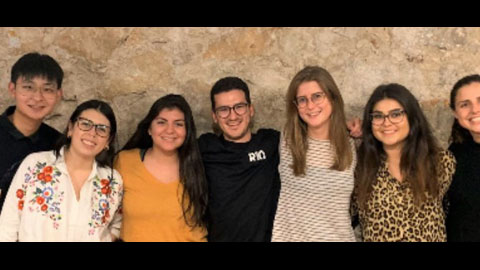Students of the SAES Master’s Degree, finalists of the Urban Greenhouse Challenge

Students of the ICTA-UAB Master's Degree in Interdisciplinary Studies in Environmental, Economic and Social Sustainability and of the Bachelor's Degree in Management of Smart and Sustainable Cities of the School of Engineering are finalists of the Urban Greenhouse Challenge International competition.
26/06/2020
The Team Bagua, consisting of five students of the ICTA-UAB Master's Degree in Interdisciplinary Studies in Environmental, Economic and Social Sustainability and one student of the Bachelor's Degree in Management of Smart and Sustainable Cities of the School of Engineering School, is one of the 10 finalists teams of the Urban Greenhouse Challenge, an International competition organized by the Wageningen University & Research. The SosteniPra group, led by Xavier Gabarrell and formed by researchers Perla Zambrano, Joan Muñoz, Alexandra Peña and Susana Toboso, has been assessing the Team Bagua for the last six months.
In Urban Greenhouse Challenge, multidisciplinary student teams are challenged to bring professional food production (back) into urban neighbourhoods integrating social, economic, environmental and technical aspects in one coherent concept. This edition invited students to design an iconic and circular urban greenhouse to be based in the city of Dongguan, which is part of the Greater Bay Area in China, one of the world’s major metropoles.
The Selection Committee assessed the 53 teams participating in the first round according to criteria such as the relevance and attractiveness of the proposed program in relation to main conclusions of the context analysis and assignment, or the appropriateness of the choices regarding food production system, circularity, constructions system, business model and social interactions. 20 teams were selected inthe second round. The members of the Spanish team are Alejandro Rueda, Rachel Wilbertz, Olivia Manzart, Sofie De Brabander, Nicole Rodas and Ruijie Shi.
With climate change and global change becoming significantly important, urban farming offers an innovative way to address one of the large carbon emissions sectors, agriculture, while offering a viable adaptation system for food production. Through studying sustainability, they are looking forward to applying their interdisciplinary approach and knowledge into practice through urban farming.
Through innovation, they want to create a project that is sustainable, feasible and has low energy demands through the integration of the architecture and the inner system. The Bagua building is both a food hub and an educational center: a stacked semi-closed greenhouse which makes use of the local conditions using the latest technologies -like the Sky Green Towers and the Plant Factory with Artificial Lighting systems (PFAL)- to produce fresh and healthy food within our planetary boundaries. The Bagua also aims to be an inclusive place for everybody, with spaces dedicated to enable a range of activities targeted to foster social cohesion and knowledge exchange. Inspired by Taoism, flows of resources and synergies between production and consumption help restore the balance between humanity and nature.
In the core of the concept is the Dao, “the way” – a way forward into the future in which we embrace the change and the flow of nature. For this, we need to be flexible and adaptable; go with the Dao. Thus, the Bagua takes in the sun’s energy, that is given to us for free, in as much as possible. Each area of the food production thus was designed to have an optimal relation with the light it would receive.
However, the Bagua aims not only to become an Urban Greenhouse, it also aims to become a symbol for the city and be and education center. The balance aimed to represent had to exist within the building. Therefore, both the food production and the social activities will be encompassed in a design that aims to achieve maximum circularity, by taking advantage of the abundant sunlight and rain present in Dongguan, creating synergies and flows of resources between the activities and crops.
The project offers opportunities to many people to change their lives for the better whilst at the same time working on global challenges. The Bagua believes that if we aim to achieve the great food transformation and produce healthy and sustainable food, we need to educate our next generation of farmers and entrepreneurs.
Main functions of the building
First of all, Bagua is intended to provide fresh, healthy and nutritious food to the city dwellers and tourists. There will be the possibility to enjoy the freshly produced food at the 0km restaurant and tea house. The food will also be sold in the onsite market, to local restaurants and companies in Dongguan and delivered at home. Secondly, there will be a health center in which both traditional Chinese medicine (traditional Chinese herbs and teas grown in the greenhouse) and healthy activities will be offered to address health issues in the local community. Activities will focus on both physical and mental health, for example yoga, relaxation sessions and horticultural therapy. Thirdly, Bagua will contribute to building healthy communities by providing educational workshops to visitors, surrounding companies and universities. The workshops will focus on nutrition, cooking, gardening, composting and farming. The farm will also provide multi-functional spaces to be rented out for local businesses, art and music projects. Community cohesion will be improved through these different activities organized and the presence of community spaces and a community garden. Finally, Bagua will be a place to unwind and enjoy the surroundings, be connected to nature as well as to fellow visitors.
This information is related to the following SDG
Sustainable cities and communities
Climate action